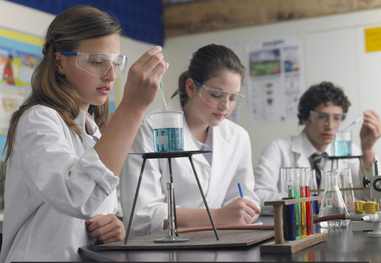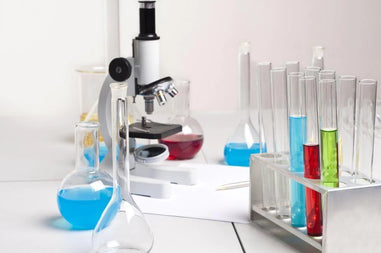- No products in the cart.
While chemistry sounds like a subject that would only be taught at higher levels, it can be a fun and exciting subject to introduce at the elementary level. You just need to flesh out the simpler concepts and use more of a visual and hands-on approach.
Here we will discuss the concepts to teach to elementary students, elementary school chemistry lab needs such as the chemicals to have on hand in an elementary lab, safety practices that should be enforced in a chemical lab, and the best practices for lab storage in an elementary setting.
What is basic chemistry that can be taught in elementary grades?
Chemistry is used in our everyday lives and children at the elementary level are just beginning to discover how the world around them affects them. Doctors use chemicals to make medicine when we are sick, chemicals are used to make electronics such as TVs and cell phones, and farmers use chemistry to grow crops so we have food to eat.

From there, you can flesh out the simple concept that everything is made up of matter and talk about its properties such as the states of matter, atoms & elements, molecules & compounds, solutions & mixtures, the periodic table, and density. For example, when exploring the principles of solutions and changes in state, you can take water and freeze it into ice cubes.
Animals and plants can also be used in the classroom to study the different principles. Animals can be used for observation, comparison, interrelationships, and the complexity of life. Plants can teach students about the needs of living things, observation skills, measurement, and classification.
There’s quite a bit of chemistry that can be covered on the elementary level.
What chemicals are used in elementary schools?
Here’s a list of chemicals that you will want to have on hand in your elementary school chemistry lab to cover demonstrations of the topics listed above:
- Acetic Acid
- Acetone
- Ammonium Hydroxide
- Calcium Carbonate
- Calcium Chloride – Granular form
- Copper Sulfate - Pentahydrate
- Corn Starch – Powder form
- Dextrose or Monohydrate – Powder form
- Ethanol 200 Proof
- Hydrochloric Acid
- IKI – Iodine and Potassium Iodide Solution
- III - Iron Chloride Solution
- Isopropyl Alcohol (IPA) 70% or 99%
- Magnesium – Ribbon form
- Methanol
- Phenolphthalein
- Potassium Chloride
- Potassium Hydroxide
- Potassium Iodide
- Sodium Acetate or Trihydrate
- Sodium Bicarbonate
- Sodium Borate or Decahydrate
- Sodium Carbonate or Anhydrous
- Sodium Chloride
- Sodium Hydroxide
- Sulfuric Acid
- Water - HPLC Grade
- Zinc
Always have a MSDS on file for each chemical and make sure that the file is easily accessible. The MSDS will provide information such as the physical properties of each chemical, the toxicity, storage, and handling of the chemical. Also, limit the supply purchased to either one school year or the shelf life of the chemical.
Practicing chemical safety in an elementary chemistry lab: What safety equipment should be used in your elementary science lab?
Safety equipment should always be provided in an elementary chemistry lab to prevent injury and clean up spills.
Here’s a list of the protective equipment that should be easily accessible and always on hand:
Elementary chemistry lab storage best practices
It’s important to label chemicals accurately and store them securely. When labeling chemicals include the manufacturer, address, and telephone number. Also, include the chemical name, the date the chemical was received, the hazard symbol, the strength of the chemical, and emergency or first-aid instructions.
Store chemicals in a locked storage area and mark the storage area with NFPA warning symbols to show the highest rating of any chemical stored there in each category. This will alert firefighters in case of an emergency. Keep an updated inventory on file of every chemical in storage. To properly store and separate chemicals, use wooden shelves with front lips that prevent sliding. Flammables, bases, and acids should be stored in well ventilated and separate areas.
Lab Pro offers a large variety of elementary school chemistry lab needs. For over 40 years, Lab Pro Inc. has been committed to delivering the highest quality elementary school chemistry lab needs, hand tools, chemicals, lab equipment, distance learning kits, lab supplies, and cleanroom PPE apparel to medical device companies and laboratories worldwide. To learn more, visit the biggest Lab Supply showroom in California, or contact us online or at 888-452-2776.












































Good morning, today is May 3, 2024, and my name is Mr.Donovan Colin Castell. Please mail any printed matter that would best facilitate the objectives of the instant business. Thank you for the courtesy.